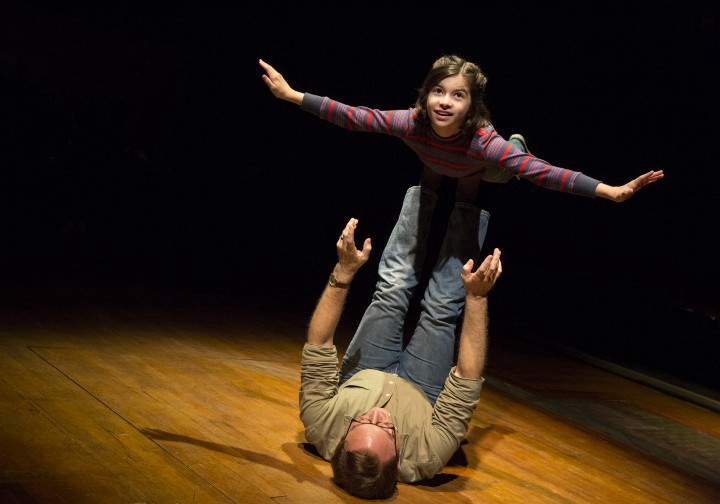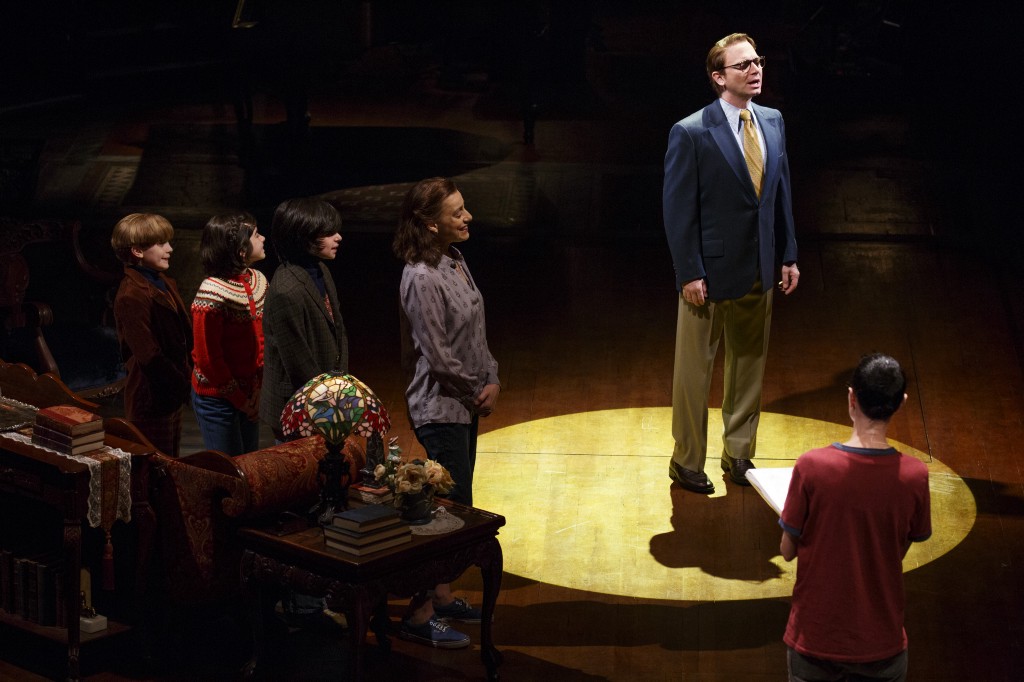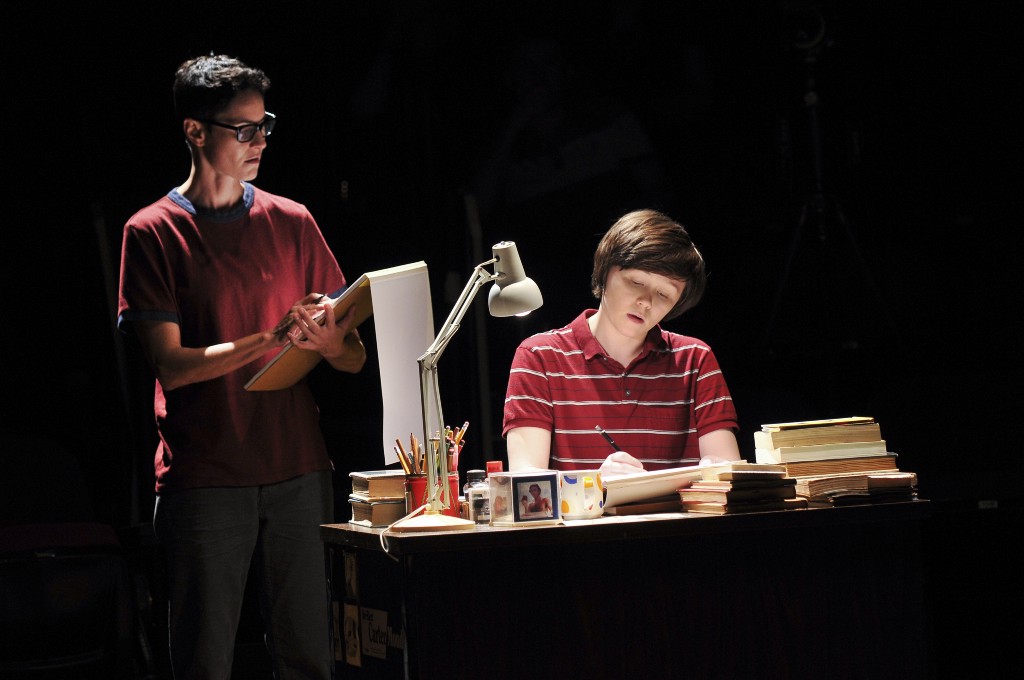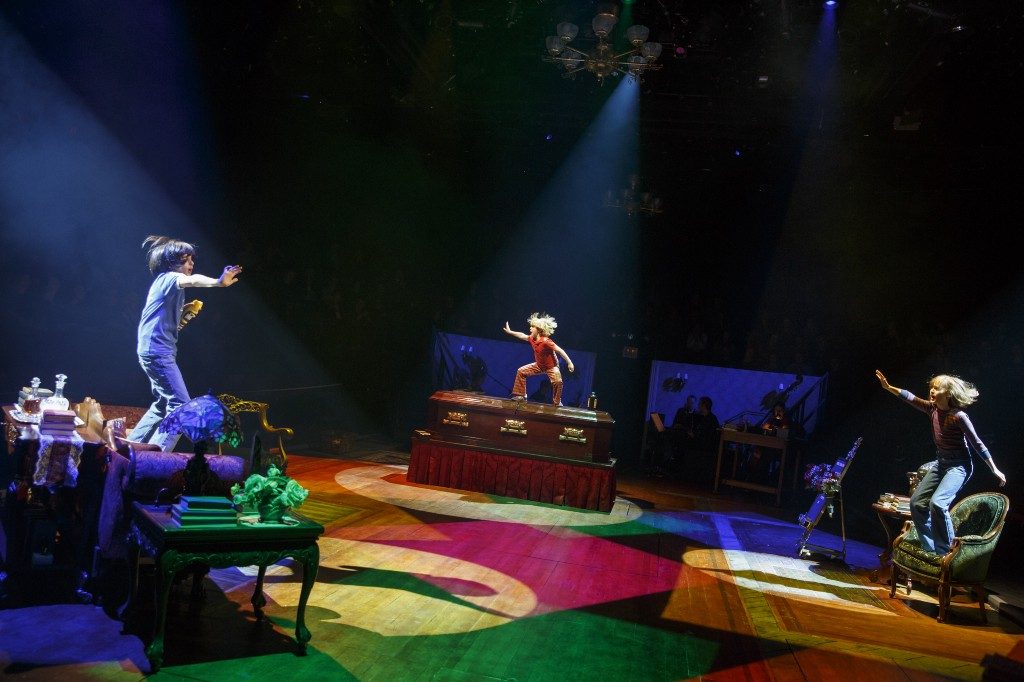
Musicals take many years to develop, and when that development results in a successful Broadway run, saying goodbye can be bittersweet. “Fun Home,” an adaptation of Alison Bechdel’s graphic novel memoir about her coming out as a lesbian in college just months before her closeted gay father committed suicide, opened on Broadway in April of 2015 and won the Tony Award for Best Musical. Composer Jeanine Tesori and bookwriter/lyricist Lisa Kron were also the first all-female writing team to win the Tony Award for Best Score. As the Broadway run of comes to a close this Saturday, Tesori and Kron spoke with Women and Hollywood about seeing the show come to the end of its run, writing musicals without the male gaze, the lesbian image-making that made “Fun Home” possible, and what they hope will be the show’s legacy.
W&H: What are your feelings on the end of the Broadway run?
Jeanine Tesori: That’s a hard question. It’s a hard question because it’s a blend of many things. It’s not just one predominant color. There are a lot of beginnings and endings this summer. The “Fun Home” Broadway run is ending, but the tour is beginning. The summer’s ending, but the fall is beginning. My daughter’s going off to her first year of college. It’s a mixture of so many emotions.
Lisa Kron: It’s definitely mitigated by the fact that we started rehearsal this week for our national tour. Shows close. It’s the thing about theater. If you make a movie or write a book or paint a painting, that thing exists in a physical form. Theater is always experiential. There’s no there there. When you make a piece of work that you’re very proud of, you want that to keep repeating as long as possible, but they always do close. We had an incredible run. We couldn’t have asked for more from our run. We recouped, we won a bunch of Tonys. Also, to have a production that you feel is the fullest iteration of the thing you hoped it would be, it just doesn’t happen that often. This is the moment when it’s about to go out into the world. The tour is going to happen, licensing will start, and then other theaters will do it, and it will be done internationally. It feels very exciting to see what’s going to happen with it next.
JT: The great thing about a tour, I love New York City, I live here, but New York City is but one part of America, and when a work goes out to meet other people I think it’s at its strongest because it meets people where they are as opposed to people traveling to a certain place. The ability to go into communities, and that means regional theaters, and hopefully it will be done in high schools and colleges where it can be widely cast and directed by students. I hope that it reaches really far into every community level.

W&H: Do you have stories of seeing people deeply affected by the show?
JT: The most important thing to me was the first night that the Bechdel family gathered and saw it together, that Alison and her brothers saw it and stayed behind in the row while everybody left and just cried. Nothing mattered more than that because it really is their story. We dramatized it and put it on stage and made it public and with that comes a great responsibility because these people lived and it happened. I’m so happy to not have that burden anymore because it really was a burden to wake up every day thinking, are we going to fuck up this family story? The stakes were really high that way.
W&H: To what extent do you think “Fun Home” has changed the Broadway landscape?
LK: In my dreams, it would have been, along with other shows, a moment we could point to that says this is where the parity issue in the theater was solved. And there would be more lesbian characters in shows with actual three-dimensional parts, and also that there would be more trust in work that doesn’t appear to be “commercial.” It remains to be seen whether any of that will happen. It’s my understanding that so far the upcoming season appears to be a reversion to the status quo. And this is what has happened many times. It’s not just in the theater, it’s everywhere. There seems to be this ceiling and you get to this certain percentage of women or racial and cultural minorities, and everyone is like, look how great this is, the tide is finally turning. And then the numbers drop right back down. It’s happened many times. The powers of reversion are extremely strong. I would say, though, that there are many, many people determined to push for permanent change. We talk about diversity like it’s an addition of something, like some kind of spicy added flavor, but it’s not the addition of anything. It’s the undoing of a narrow and exclusive focus.

W&H: With “Fun Home,” people have said, “I finally see myself on stage,” or I’ve heard people comment that they finally have seen a show written completely without the male gaze. Do you feel “Fun Home” is revolutionary in this way?
JT: “Revolution” is like the word “genius.” It just gets thrown around to the point where I’m not even sure what it means. “Fun Home” is part of a legacy of a lot musicals. It’s part of a line that I think started with Sondheim, Rodgers and Hammerstein, with musicals as plays. The fact that it met its time, that we opened right before the Supreme Court decision passed. Musicals are not light on their feet often. You can’t shoot a musical in the way you can do a YouTube video and then have a response an hour later. Musicals take five to eight years on average just because their gestation is so long, going back and forth. And so that it met its time is, I think, miraculous.
LK: I would say that it’s more a signpost of an evolution that has been happening for a long time. When we started, I could never imagine that what happened to “Fun Home” was possible. I think that’s because it probably was not possible at that time. I’ve had very lucky timing all through my career, kind of on the crest of a wave. Those doors had not been open even a few years earlier for my mentors, the women who changed my life when I saw their work — incredibly fine work. The phenomenon of “Fun Home” on Broadway is only possible because it’s part of a long continuum of lesbian image-making. Lesbian artists, queer artists, political activist working for decades created the cultural framework that made “Fun Home” possible. Alison was doing that work with “Dykes to Watch Out For.” The Five Lesbian Brothers were doing it. We were all working on the fringes, but all of that builds up in the cultural ether. Gay marriage made a huge difference to the way people were able to watch the show. One of the things that was most surprising to me about the way straight audiences watched “Fun Home” was that in the scenes between Medium Alison and Joan, those dorm room scenes, the audiences disappeared into identification with those characters without a sense of mediation, or othering. That is an amazing thing to watch. They watch it and identify with it as a love story. Period.
JT: For me, it is about the male gaze but not by definition. It’s trying to understand the male gaze as a daughter and understand how we can liberate ourselves and understand it in terms of having compassion for the people who guided us, made us, in some ways tried to break us because of their own battles. That is different than the romantic male gaze or the idea that women are objectified. This woman is the subject, she has agency. That is the kind of character I love to write for.
W&H: Has anything changed in how you now look at the show?
JT: I can’t really look at the show, it’s really painful. I put so many of my own struggles inside the notes to that show, and I really try with everything I do to give it my whole being, but this really went to — I put it all out there on the mat. I was inspired by what Alison divulged and I thought, I’m going to do that too. I sort of wish I could go backward and maybe at one point I’ll be able get some freshness on it where I can sit and watch it and appreciate it at a distance.
W&H: Has working on “Fun Home” changed how you work on future projects?
JT: If anything, it has solidified that understanding that we are completely innocent of what the show is when going to do the next one. I have to approach it with a beginner’s mind, start all over again. At the same time, I don’t think anything will be as hard as “Fun Home,” and knowing that we got to the other side by persistence gives me confidence. If we can slay that dragon, let’s not shy away from the next challenge, whatever that is. Let’s just keep chipping away at it, and if it fails, it fails. I thought that “Fun Home” would fail multiple times, and it didn‘t.
LK: Marsha Norman always says that once you write a musical, you’ll never go back. It’s true, it’s the most intoxicating thing. But musicals are also the hardest. They’re very mysterious. They’re extremely strange. And figuring out strange good versus strange stupid is really the eternal trick of the musical.
W&H: What do you hope will be the show’s legacy?
LK: The dream would be that it has perennial appeal. If it’s only about this moment, if it’s only about the lesbian breakthrough part of it, that would be sad for us as a theater makers. There’s no way to know if your work will stand the test of time, but certainly we were trying to make a musical that, in its specificity, would explore some essential human yearnings and conundrums. If we’ve done that, if we’ve made it confoundingly human enough, then it will last on its own terms after the political significance of this moment of it is a memory.
JT: A lot has been done, but there’s a lot of work to do with making sure that female talent at the young level, not coming over from the pop world, which is fantastic, but being a theatrical writer, it just takes years. I only feel now that I’m somewhat grasping the craft. Years and years of work, and so you have to go back. That’s my great hope, that we will inspire someone who right now is 12 or 13 and starts writing theater.







